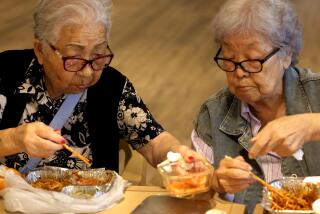Kosher Kitchen : Dining: The cooks make do without salt but there is plenty of zest in the traditional meals served to the elderly at the Fairfax Cafe.
FAIRFAX — It may not be Spago, Citrus or Michael’s, but for $1.75 you can’t go wrong at the newest cafe on Fairfax Avenue. Except for salt.
“The seniors are very sensitive. They can pick up salt at 20 paces,” said Barbara Parker, director of nutrition services for Jewish Family Service, which opened the kosher kitchen and lunchroom at 340 N. Fairfax Ave. just over a month ago.
In fact, the cooks put no salt at all in the 900 to 1,200 kosher meals they prepare five days a week, project manager Virginia Mayer said.
“Kosher meat is quite salty anyway,” she noted.
Instead, they dip into tall jars of paprika, dill, turmeric, ginger and rosemary to perk up the flavor of foods ranging from chicken to brisket to nice potato knishes.
“This is a godsend for the older people, because we have company and we don’t have to stay home and eat alone,” said lunchtime regular Ina Kent, who admits to hitting 70--”but I won’t mention another minute over that.”
“It’s within everybody’s means,” she said. “And you’ll never get sick from this food.”
The kitchen sends government- subsidized hot or frozen meals to shut-ins and to daily gatherings of senior citizens, AIDS patients and people with disabilities at 10 other sites in Los Angeles and West Hollywood.
At the Fairfax Cafe, facing on the busy avenue through big picture windows, 80 or more old folks fill the tables from 11:30 a.m. to 1 p.m. The lunchroom has doubled its clientele since it opened on the former site of a Chinese laundry Sept. 14.
Previously, Jewish Family Service muddled through with a succession of caterers, at least 11 in as many years, Parker said.
They found it hard to provide a kosher meal on a government subsidy that was meant to provide a hot meal a day for senior citizens who don’t know or care about the dietary obligations of Jewish law, she said.
Not only do traditionally minded Jews not mix milk and meat, the meat has to be slaughtered under rabbinical supervision and soaked and salted (to remove the blood), all of which adds to the cost.
“I’m not sure the caterers could always project in a businesslike way how much it would cost them,” Parker said. “It sounded great going in, but after they’d done it for a year they realized it wasn’t.”
Things came to such a pass that when the City of Los Angeles disqualified one caterer for not having a big enough kitchen in 1990, non-kosher food was substituted, setting off objections from Orthodox rabbis and forcing hundreds of steady customers to drop out.
After seven weeks, the Jewish Federation Council of Greater Los Angeles came up with $120,000, enough to restore the kosher meals just in time for the Passover holiday that year.
Then an angel appeared in the earthly form of Stan Hirsh, a rough-hewn garment district macher and former president of the federation, which raises money for charities and social services here and abroad.
Two years later, aided by a $600,000 grant from Hirsh and his family, the kitchen and lunchroom are open for business in the converted laundry building, now owned by Jewish Family Service.
“It was a community need and I happened to be there at the time,” said Hirsh, who is also on the board of Jewish Family Service. “I got involved so they could have their own facility and not be beholden to anybody.”
The family service agency relies on the hard-pressed federation for a yearly grant of $57,000 to cover the extra costs of kosher cooking, according to Paul Castro, director of finance and admininstration for Jewish Family Service.
A spokeswomen for the federation, which was forced to cut $6.9 million from its budget this year after falling short of its fund-raising goal, said there are no plans to reduce the subsidy further, at least for now.
“In the future, we hope we can control that cost so we won’t need the subsidy at all,” said Hirsh, who owns and operates the Cooper Building Mercantile Center in downtown Los Angeles. His family also underwrote construction of a community center serving Jews and Arabs in the Israeli city of Jaffa.
For now, Jewish Family Service pays Mayer $3.24 a meal, down from the $3.49 it was paying its previous caterer.
Mayer, who previously worked for ARA Food Services and supervised hospital, school lunch and jail programs in Phoenix, heads a staff of 11, aided and watched over by Arie Dubov, a New York-trained rabbi.
With a meat-only kitchen, Dubov said, his job is simpler than it would be at an establishment that also serves dairy products, but he keeps busy logging deliveries, sealing shipments, and opening and closing the kitchen every day, among other duties.
The kitchen is also responsible to city and county authorities for providing one-third of daily minimum nutritional requirements, Mayer told visitors recently. She uses a computer to keep track of recipes, nutrition values and numbers of meals served.
As she spoke, one worker used a quart-sized measuring cup to toss a yard-long vat of salad, while another unpacked frozen spinach bricks and others hosed down big pots, packed aluminum trays and poured juice into plastic carrying cases.
In the cafe, customers from as far away as Vermont Avenue or Alvarado Street gathered at wood tables designed, like the rest of the establishment, by S. Y. Rykoff, the restaurant supply company.
When the meal was ready, one man stood to chant a blessing over the food. Volunteers carried the lunch, served on disposable plates, to the crowded tables. A lady giggled about her hairdressing appointment.
“It’s such a big factor in my life,” said Fay Levine, 73, who once ran a restaurant in Chicago but now volunteers at the kitchen three days a week.
“It’s like a miracle. You get out and meet the world. The next step for these people is the nursing home, and this way they push themselves out of the house every day and they have a meal and they’re out with other people.”
More to Read
Eat your way across L.A.
Get our weekly Tasting Notes newsletter for reviews, news and more.
You may occasionally receive promotional content from the Los Angeles Times.










